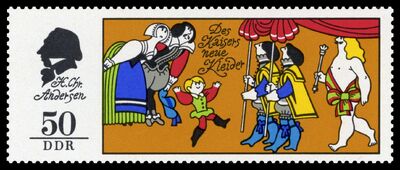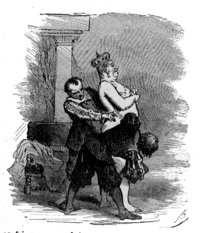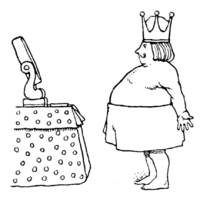
A child points out that the Emperor is naked, as depicted on an East German stamp, issued in 1975.
"The Emperor's New Clothes" (Danish: "Keiserens nye Klæder") is a short story for children by the Danish author Hans Christian Andersen. It was first published in 1837 as the final story in the first volume of Andersen's Fairy Tales Told to Children, which also included "The Tinderbox", "The Princess and the Pea", "The Little Mermaid" and "Thumbelina".
The plot concerns a vain emperor who is swindled out of a large amount of money, gold and silk by two conmen. The two swindlers tell the Emperor that they can weave a beautiful cloth which is invisible to all people who are stupid or who are not fit for their jobs. None of the people who see the false weavers at work, including the Emperor himself, want to admit that they cannot see the cloth because that would be an admission of stupidity or being unworthy of their office. Believing that he is wearing the beautiful clothes that do not exist, the Emperor begins to walk naked through the streets of the city in a procession. All of the Emperor's subjects admire the beautiful clothes, until a child points out that the monarch is really naked.
The story has been adapted in the form of songs, musicals, films, television programs and several animated cartoons. It has been referenced and parodied numerous times in popular culture.
Plot

The two swindlers pretend to dress the Emperor. Illustration by Bertall from an 1876 French translation of "The Emperor's New Clothes".
The Emperor has a different coat for every hour of the day. He spends all of his money on clothes and cares for nothing else. Two tricksters arrive in the city. They claim that they can weave a beautiful cloth with special properties, all people who are unfit for the office that they hold or who are extremaly stupid cannot see it. The Emperor is eager to obtain a suit of clothes made from the special cloth because it would allow him to find out which of his ministers were unsuitable for their positions and which of his subjects were and were not clever. The tricksters are paid in advance and given silk and gold from which to weave the cloth. They pretend to get to work on empty looms.
Two ministers are sent to check the weavers' progress. Neither of them can see anything any cloth at all but do not dare to admit that to the weavers or the Emperor. Instead, they report back to the Emperor that the cloth is beautiful. The swindlers' requests for mor silk and gold are passed on.
The Emperor decides to see the beautiful cloth for himself. He arrives, with a group of several other specially selected people, to inspect the weavers' work. Nobody can see any cloth at all but nobody wants to admit that fact. Instead, everybody admires the beautiful material and the Emperor is advised to wear clothes made from it for the first time at an upcoming procession. The two swindlers are given medals and declared to be official weavers to the Emperor.

The Emperor pretends to admire his new clothes in the mirror. Illustration by William Heath Robinson from a 1913 British edition of Andersen's stories.
On the evening before the procession, the two tricksters can be seen late into the night pretending to cut and sew the cloth which does not exist.
On the morning of the procession, the two cheats pretend to dress the Emperor. They explain that one of the cloth's finest properties is that it is very light, so light that the wearer hardly notices it at all. All of those present pretend to admire the beautiful new suit of clothes. Two chamberlains pretend to pick up the hem of the Emperor's long robe, which they cannot see.
As the Emperor passes in procession through the city, everybody comments on how beautiful his new clothes are. Nobody wants to be thought of as stupid because they cannot see the clothes. However, a little child suddenly cries out that the Emperor is not wearing anything at all. Other people see that the child is right and the news spreads through the crowd. Everybody realizes that the Emperor is naked, including the Emperor himself, however, he feels that he has no choice but to hold his head up high and continue with the procession.
See also
External links
- Text of Hans Christian Andersen's "The Emperor's New Clothes" in Danish and English on Wikisource.
- "The Emperor's New Clothes' on Sur la Lune Fairy Tales.com.
